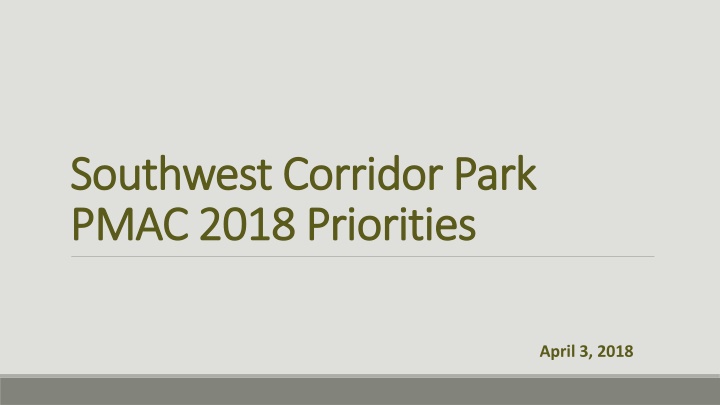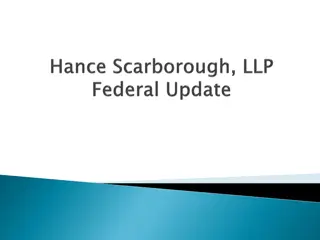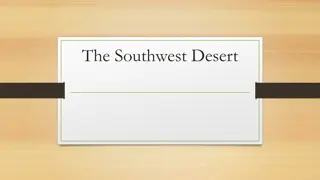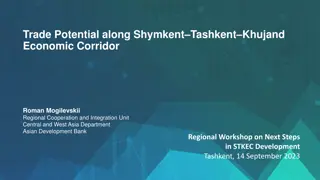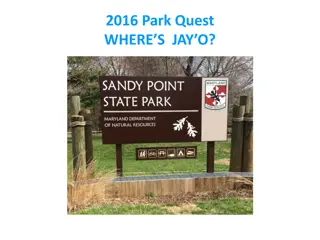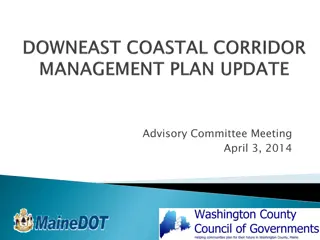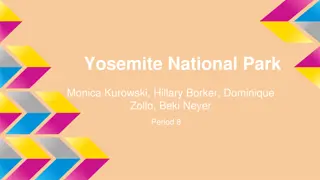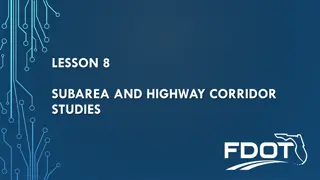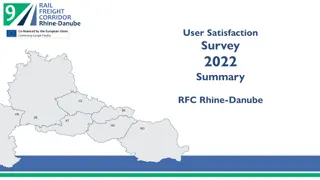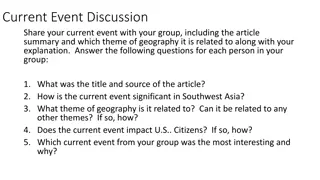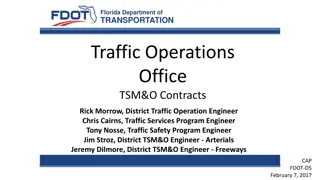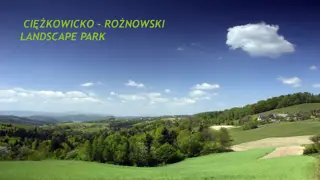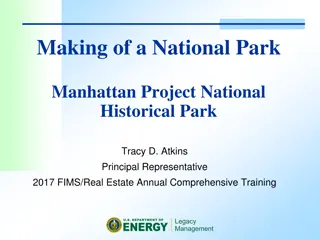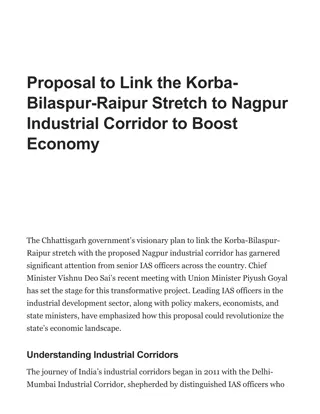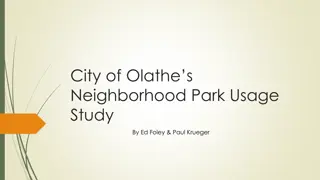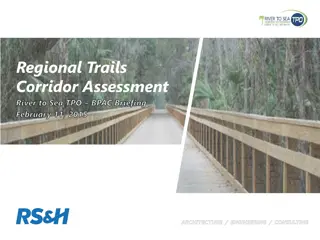Southwest Corridor Park PMAC 2018 Priorities
Southwest Corridor Park PMAC 2018 Priorities include infrastructure maintenance, path striping for bikes and pedestrians, greenway extension, skate park, dog park, and various other project initiatives. The list of key projects by project stage categorizes them based on their readiness and current status, ranging from ready-to-implement to ongoing work needing increased resources.
Download Presentation

Please find below an Image/Link to download the presentation.
The content on the website is provided AS IS for your information and personal use only. It may not be sold, licensed, or shared on other websites without obtaining consent from the author.If you encounter any issues during the download, it is possible that the publisher has removed the file from their server.
You are allowed to download the files provided on this website for personal or commercial use, subject to the condition that they are used lawfully. All files are the property of their respective owners.
The content on the website is provided AS IS for your information and personal use only. It may not be sold, licensed, or shared on other websites without obtaining consent from the author.
E N D
Presentation Transcript
Southwest Corridor Park Southwest Corridor Park PMAC 2018 Priorities PMAC 2018 Priorities April 3, 2018
Infrastructure Maintenance of park Path striping for bikes and pedestrians, improve safety ! Move forward with Greenway Extension Complete Skate Park Dog Park Location & Start Process
Project List # Topic: Date Requested: Project Status: 1 Skate Park in JP 2011 / 2012 2 Greenway Extension 3 Bike/Walking Path Striping May 2015 4 Water Study Follow-up 2014 5 Oakdale Community Garden Sept. 2016 6 Dog Park in JP Aug. 2016 7 Tree Study & Replacement 8 Park Signage (Review and Update) 9 Stenciling and/or Fence for Jackson Square Playground 2014 / 2015 / 2017 10 Rose Garden Updates Nov. 2017 11 Northampton Green Updates Nov. 2017 12 Park maintenance various items fences, walls, granite curbs, bricks, etc. Varies
List of Key Projects By Project Stage Category Project [A.] Ready-to-implement 1. Bike/Walking Path Striping and Stenciling 2. Stenciling and/or fence for Jackson Sq. playground 3. Skate Park [B.] Seeking commitment for projects 1. Oakdale Community Garden (MBTA DCR) 2. Greenway Extension Project (MBTA DCR) 3. JP Dog Park [C.] Planning stage 1. Tree Study and Replacement 2. Park Signage Review and Replacement 3. Water Study Follow-up (Read & Discuss 2015 Study) 4. Rose Garden Project 5. Northampton Green Project Develop scope of work Identify resources or keep eyes open for resources [D.] Ongoing Work / Increased Resources Needed 1. Increase Resources for Long-Term Maintenance Park Hardscape Repairs (fences, walls, brick, granite, etc.)
Bicycle/Walking Path Striping and Stenciling Project: Background: Bicycle/Walking Path Striping and Stenciling Timeframe: Request shared with DCR in May 2015 History: The request is based on analysis of SWCP bicycle/walking path travel patterns and on the results of a PMAC survey about bicycle/walking path courtesy, civility and safety issues. The survey had 600 responses, with extensive comments. Details of the survey, the striping/stenciling request, and a map showing requested markings are available at http://swcpc.org/bicycling.asp A request by PMAC for a center stripe on the bike path and stenciling on the bicycle and pedestrian paths, from Mass. Ave. to Forest Hills. Details are included in the written request and accompanying map. There should be no major barriers to implementing this request. We understand that there were delays while DCR considered a uniform policy for all state park striping/stenciling; and then a number of DCR staff changes that may have allowed the request to lose attention. Current/Next steps: * Reconnect with DCR Engineering Network with other bicycle/pedestrian advocates
Stenciling and Path Markings - Jackson Sq. Playground Project: Background: Stenciling and Path Markings Jackson Sq. Playground Timeframe: Request shared with DCR as part of Striping/Stenciling Request in May 2015. Email to DCR Commissioner in November 2017. History: Prior to PMAC s October 2017 Annual Meeting, the PMAC Chair shared the annual meeting presentation with children and teens at Mildred Hailey (Bromley Heath) Apartments in Jackson Square. Upon seeing the last slide, which asked for brainstorming about park improvements, the group unanimously asked for safety improvements along the edge of the playground, where the playground meets the bike path. This request had already been part of our requests to DCR, prompted by observation and by numerous concerns raised by park users (via social media, email and conversation). This was requested in June 2014, and again as part of the overall striping/stenciling request in November 2015. A request by PMAC for a stenciling on the bike path by the Lorber Family Playground in Jackson Square. Stenciling would say Playground Ahead Watch for Children on the path approachIng the playground from both directions, and white paint would mark a crosswalk where the path runs along the playground. We also request analysis to see if a fence or low plantings could provide additional safety. Current/Next steps: Advocate for initial steps a.s.a.p., while also integrating this into the overall striping/stenciling request Consider option of signs (rather than paint stenciling) as an immediately do-able option.
Oakdale Community Garden Project: Background: Oakdale Community Garden Timeframe: See attached letter, dated Sept. 19, 2016 A parcel of MBTA-owned land along Oakdale Street in JP has been used as a community garden. There has been a proposal to transfer ownership and care and control from MBTA to DCR.
Greenway Extension Project: Background: Greenway Extension Timeframe: PMAC contacted DCR officials beginning in 2011 that money was available from private developers for development of an extension to the SWCP. DCR has held that the land is under ownership of MassDot and DCR A parcel of MBTA-owned land in the Stonybrook neighborhood in JP has been identified for open space use, with a proposal to transfer ownership, care and control of the land from the MBTA to DCR. With new development taking place in this neighborhood, developers have provided money, via the Stonybrook Neighborhood Association, to support landscape design or other first steps. can t be involved in implementation or design until the land is transferred in a Care and Control agreement similar to that held for the present SWCP. The most recent enquiry of June 2, 2016 to Commissioner Leo Roy of DCR hasn t been answered. History: The Stonybrook Neighborhood Assoc (SNA) proposed this extension to the SWCP during the process of negotiations for two large developments that are bringing retail and 407 residential housing units to land adjacent to the Orange line. The SNA identified abandoned land on the East side of the Orange line tracks and contacted the MBTA regarding transfer to DCR so that the land could become public parkland and an extension to the SWCP. $50,000. toward design and $75,000. toward construction has been secured from the 2 development teams. PMAC has had a SWCP Ext working committee since 2011. The final Cooperation Agreement between developers and BPDA was signed in October, 2017. It guarantees the additional money that will bring total available funds to $125,000. for implementation of this SWCP Extension. If after 10 years the project is still stopped, the money can be applied to another parkland project. Current/Next steps: Two of the abutting developments will contain 124 units of owner occupied condominium housing. They will be occupied by approximately January of 2020 when we will gain a valuable resource of new committed voices for a campaign to pressure DCR into the transfer of the land from MassDot to DCR control.
Skateboard Park Project: Background: Skateboard Park Timeframe: Project planning since 2011 The Skateboard Park is an approved public-private partnership, with a completed design, now awaiting implementation. History: Skateboarders began informally using a hockey rink near Stony Brook T station in the SWCP. In 2011 they met with PMAC and DCR to propose a formal skateboard park in that space, wrote a proposal, gained community support, identified matching funds, and applied for, and in 2012 were awarded, a public- private partnership project with DCR. A skateboard park design architect was engaged and developed a park design in 2012- 2013. The design has been completed and now awaits implementation. Current/Next steps: * Research current status; read/review the public-private partnership agreement
Tree Study and Replacement Project: Background: Tree Study and Replacement Timeframe: Identified in Oct 2017 annual meeting; Under discussion for a longer period The Southwest Corridor Park Conservancy requests a formal assessment and planning process for looking at trees in the park and making a plan for tree replacement wherever trees are reaching the end of their lifespan. History: During the brainstorming session at the October 2017 PMAC Annual Meeting, there was strong support for attention to trees, hardscape, signage and other park features. Because the park is now approaching 30 years old, many of the original plantings and structures need rejuvenation or replacement. Current/Next steps: Develop a scope of work Identify plans for a method for managing the study (part of scope of work) Determine which steps can be completed by volunteers, and with what supporting resources and training Identify resources needed for gradual replacement of trees Identify resources currently available; make a plan to watch for, await or seek out resources as needed.
JP Dog Park Proposal Project: Background: JP Dog Park Proposal Timeframe: Petition in Winter/Spring 2017; First DCR public meeting in April 2017 History: Dog owners in JP are working with the city and state to advocate for a dog park, potentially in the Southwest Corridor Park. PMAC members assisted the dog owners group and DCR in looking at potential locations. A DCR public meeting in April 2017 assessed one potential location; that location was decided against. The process is still open, with a public meeting expected this coming spring. Current/Next steps: Continue to encourage open communication; help to publicize DCR meeting (Consider a green dog dog owner pledge encourage dog owners to invest in and support local parks)
Long-Term Maintenance Park Hardscape Repairs (fences, walls, brick, granite, etc.) Project: Background: Park Hardscape Repairs (fences, walls, brick, granite, etc.) Timeframe: Park Walk-Through in Summer 2016; Project identified in Oct 2017 annual meeting History: During the brainstorming session at the October 2017 PMAC Annual Meeting, there was strong support for attention to trees, hardscape, signage and other park features. Because the park is now approaching 30 years old, many of the original plantings and structures need rejuvenation or replacement. In a prior project, a PMAC subcommittee completed a walk-through of the park, assessing maintenance and landscaping issues and opportunities. Current/Next steps: Identify scope of a potential project for key improvements SWCPC potential fencing updates around gardens Other -
Park Signage Review and Updates Project: Background: Park Signage Timeframe: Project identified in Oct 2017 South End meeting and gained support at the November Annual Meeting History: During the brainstorming session at the November 2017 PMAC Annual Meeting, there was strong support for attention to trees, hardscape, signage and other park features. The issue of outdated and excessive signage, particularly in the area between Mass Ave and West Canton streets in the South End, was also raised. Some members of the community felt that excessive signage takes away from the natural beauty of the park. In addition, the signs are no longer serving a useful purpose and should be removed. Current/Next steps: Schedule a walk-through of the South End section of the park to identify the excessive/extraneous signage.
Water Study Review Project: Background: Water Study Review Timeframe: Since 2014 History: During 2014 (?) DCR conducted a water study to look at the water systems and lay the foundation for a long-term plan for necessary repairs and updates. We would like to review the study and discuss the status. While there may not be funding now, we want to know that there are projects that are ready to implement if funding were to become available. Current/Next steps: Request copy of engineering study.
Rose Garden and Northampton Green Project: Background: Rose Garden and Northampton Green Timeframe: New History: The SWCPC, prompted by neighborhood interest, seeks to work on landscaping and planting for these two garden areas. PMAC, with SWCPC, completed a neighborhood survey in Winter 2018. See http://swcpc.org/survey for the survey results summary. Current/Next steps: Seek permission and partnerships for potential public art projects. Work with DCR to assess potential landscaping changes for Rose Garden. Work on planting/replanting plan for both areas, planning for initial replantings in Rose Garden, Northampton Green in Spring/Summer 2018; map out ongoing work over time.
Three Principles of PMAC Advocacy [1.] We approach advocacy from a position of strength. PMAC is the established advisory council for the park, with a strong history of working on behalf of the park and surrounding communities. We connect a wide network of PMAC members, social media connections, neighbors and volunteers across all of the neighborhoods served by the park. [2.] What we advocate for and what we do are aligned. Park volunteers and partner organizations invest time, resources and money in the park, in garden stewardship and landscaping, management of the community gardens and dog parks, supporting park-related youth and family programming, researching and documenting park history, and bringing people together to discuss and work on park-related issues and projects. This record of work and accomplishment adds strength to our advocacy on behalf of the park. [3.] We have many interests and projects; all under a theme of building a more sustainable city. Park advocacy brings together people with varied interests, such as bicycling, gardening, open space, nature and environment, youth programming, park history, and more. The power in bringing these interests together is that all directly and indirectly support a vision for how parks help in building a more sustainable city.
About the Sustainability theme Environmental Awareness and Advocacy Think of everything you have read about the needs of a rapidly-growing city like Boston. To be a truly healthy, viable and sustainable city, city leaders and residents need to address issues including environmental conservation, transportation and open space, and need to have avenues for community building and for connecting people across socioeconomic groups, age groups and neighborhoods. Community Gardening and Garden Stewardship Community Building (Engaged citizens; connections within and across neighborhoods) Building a More Sustainable City Bicycling, Walking and Public Transportation Valuing History Parks both the parkland itself and the active networks of park volunteers and community partnerships such as the in the Southwest Corridor Park -- are an important element in building this sustainability. By recognizing and highlighting the role we play, we can better advocate for, raise funds for, and establish a vision for the park. Open space Including spaces for activities such as sports, dog walking; skateboarding; etc. Youth and Families
Approach to Advocacy - PMAC Partnerships & Relationships Boston Park Advocates: City-wide advocacy for city and state parks Environmental League of Massachusetts Statewide advocacy for a green budget of 1% of state budget for parks and environmental work Bicycle advocacy networks - Northeastern University - Community Advisory Board Through mini-grant programs connections to youth-serving organizations Neighborhood associations
About PMAC strength & advocacy How PMAC Members Use the Park 240+ PMAC Members 500+ Social Media Followers 1500 to 2000 Volunteer Hours Per Year 15- 30 Volunteer Days Per Year (with BostonCares, Northeastern University, Corporate and School Groups) 200+ Community Gardeners 1500+ Bicycle commuters per day 10,000+ MBTA commuters per day 150+ participants in youth programs & childrens gardening
